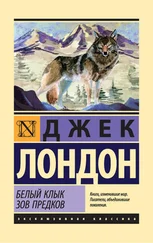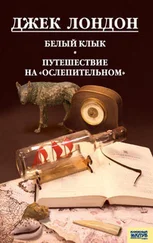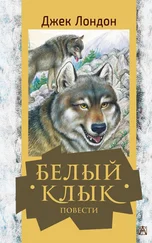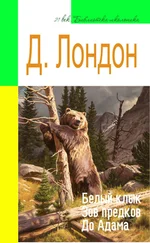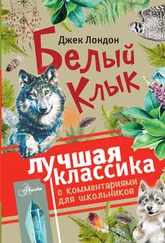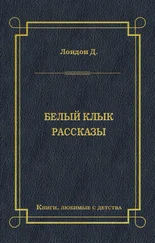There were seven puppies in the team. They were nine and ten months old, while White Fang was only eight months old.
The dogs’ ropes were of different length, which prevented the dogs attacking from the behind those that ran in front of them. To attack another, a dog would have to turn upon one at a shorter rope. In which case it would find itself facing the whip of the driver.
Mit-sah looked like his father and had much of his grey wisdom. In the past he had observed Lip-lip’s persecution of White Fang, and he decided to wreak his vengeance on him by putting him at the end of the longest rope. This made Lip-lip the leader, and was apparently an honour, but in reality it took away from him all honour, and instead he now found himself hated and persecuted by the pack.
Because he ran at the end of the longest rope, the dogs always saw him running before them. All that they saw of him was his bushy tail and hind-legs – a view far less scary than his bristling mane and sharp fangs. Also, the sight of him running away gave the dogs desire to run after him and a feeling that he ran away from them.
The moment the sled started, the team took after Lip-lip in a chase that continued all day. Lip-lip might face the pack, but he could not face that whip, and all that was left him to do was to keep his long rope taut and run.
To give point to the pursuit of the leader, Mit-sah favoured him over the other dogs. These favours woke in them jealousy and hatred. In their presence Mit-sah gave meat to him only. This was maddening to them, and they ran faster after Lip-lip.
White Fang took kindly to the work. The persecution he had suffered from the pack had made the pack less to him in the scheme of things, and man – more. Kiche was almost forgotten. So he worked hard, learned discipline, and was obedient. Faithfulness and willingness characterised him. These are essential features of the wolf and the wild-dog when they have become domesticated, and these features White Fang possessed in unusual measure.
A companionship did exist between White Fang and the other dogs, but it was war-like. He had never learned to play with them. He knew only how to fight. But now Lip-lip was no longer a leader. In camp he kept close to Mit-sah or Grey Beaver or Kloo-kooch. He did not dare to go away from the gods, for now the fangs of all dogs were against him, and he tasted the persecution that had been White Fang’s.
Now White Fang could have become the leader of the pack. But he was too morose and solitary for that.
White Fang knew the law well: to oppress the weak and obey the strong. He ate his share of meat as quickly as he could. And then came up to the dog that had not yet finished. A snarl and a flash of fangs, and White Fang finished his portion for him.
White Fang was jealous of the isolation in which he kept himself in the midst of the pack, and he fought often to preserve it. But such fights were short.
As strict as the sled-discipline of the gods, was the discipline kept by White Fang amongst his fellows. He never allowed them any familiarity. They had to feel respect for him.
He was a monstrous tyrant. He oppressed the weak easily. Not for nothing [28]had he struggled for life in his cubhood, when his mother and he had to survive in the Wild alone. He learned to walk softly when superior strength went by. He oppressed the weak, but he respected the strong.
The months passed by. Still continued the journey of Grey Beaver. White Fang’s strength was developed by the long hours on the trail, and it seemed that his mental development was nearly complete. The world as he saw it was a fierce and brutal world, a world without warmth, a world in which care and affection did not exist.
He had no affection for Grey Beaver. True, he was a god, but a most savage god. White Fang was glad to endure his lordship, but it was a lordship based upon superior intelligence and brute strength. His primacy was savage, and savagely he ruled, punishing with a blow, and rewarding merit, not by kindness, but by not giving a blow.
White Fang desired lordship.
However, he did not like the hands of the man-animals. He was suspicious of them. It was true that they sometimes gave meat, but more often they gave hurt. Hands were things to keep away from, even the hands of children.
It was in a village at the Great Slave Lake, that he modified the law that he had learned from Grey Beaver: namely, that the unpardonable crime was to bite one of the gods. In this village, after the custom of all dogs in all villages, White Fang went looking for food. A boy was cutting frozen moose-meat with an axe, and the chips were flying in the snow. White Fang, sliding by in quest of meat, stopped and began eating the chips. He saw the boy lay down the axe and take up a club. White Fang sprang aside, just in time to escape the blow. The boy pursued him, and he, a stranger in the village, fled between two tepees to find himself cornered against a high earth bank.
There was no escape. The only way out was between the two tepees, and the boy guarded it. White Fang was furious. All the wastage of meat, such as the frozen chips, belonged to the dog that found it. He had done no wrong, broken no law, yet here was this boy preparing to give him a beating. White Fang hardly understood what happened. And all the boy knew was that he had been overturned, and that his club-hand had been ripped wide open by White Fang’s teeth.
But White Fang knew that he had broken the law of the gods. He had driven his teeth into the sacred flesh of one of them, and could expect nothing but a most terrible punishment. He ran away to Grey Beaver, behind whose protecting legs he crouched when the bitten boy and the boy’s family came. But Grey Beaver defended White Fang. So did Mit-sah and Kloo-kooch. White Fang, listening to the wordy war and watching the angry gestures, knew that his act was justified. And so he learned there were gods and gods. There were his gods, and there were other gods, and between them there was a difference. But he did not have to take injustice from the other gods. And this also was a law of the gods.
Later that day Mit-sah, alone, came across the boy that had been bitten. With him were other boys. Then all the boys attacked Mit-sah. Blows were raining upon him from all sides. This was an affair of the gods, and no concern of his, White Fang decided. Then he saw that this was Mit-sah, one of his own particular gods. He was mad with anger. Five minutes later the boys ran away, many of them with the traces of his teeth on them. When Mit-sah told the story in camp, Grey Beaver ordered meat to be given to White Fang. He ordered much meat to be given, and White Fang knew that the law had got its verification.
It was in line with these experiences that White Fang came to learn the law of property and the duty of the defence of property. From the protection of his god’s body to the protection of his god’s possessions was a step, and this step he made.
The months went by, making stronger and stronger the relationship between dog and man. This was the ancient relationship that the first wolf that came in from the Wild knew. And White Fang understood it. The terms were simple. For the possession of a flesh-and-blood god, he exchanged his own liberty. Food and fire, protection and companionship, were some of the things he received from the god. In return, he guarded the god’s property, defended his body, worked for him, and obeyed him.
The possession of a god means service. White Fang’s service was of duty, but not of love. He did not know what love was. He had no experience of love. Kiche was a remote memory. Besides, not only had he left the Wild and his kind when he gave himself up to man, but the terms of the relationship were such that if ever he met Kiche again he would not leave his god to go with her. His loyalty to man seemed a greater law than the love of liberty, of kind and kin.
Читать дальше
Конец ознакомительного отрывка
Купить книгу
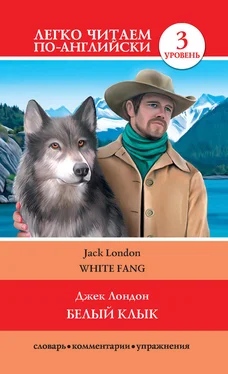
![Джек Лондон - Белый Клык [сборник]](/books/30184/dzhek-london-belyj-klyk-sbornik-thumb.webp)

